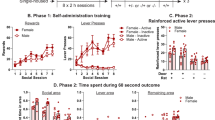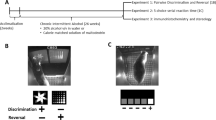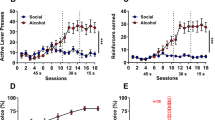Abstract
IF animals are to be used in the study of alcoholism, it is important that they show characteristics similar to human alcoholics. It has been demonstrated that animals can show tolerance and withdrawal symptoms to alcohol1: therefore, animals can legitimately be used to study these aspects. There has, however, been little evidence that animals develop the most important factor in alcoholism, a strong motivation to obtain alcohol for drinking. As there have been no demonstrations of animals learning a new response, or even continuing to make a previously learned response, to obtain drinking alcohol, in the presence of food and water ad libitum, it has been possible to claim that their alcohol consumption is ‘accidental and inadvertent’2. If this were true, experiments on voluntary alcohol drinking by animals would be of little value for generalising to humans.
This is a preview of subscription content, access via your institution
Access options
Subscribe to this journal
Receive 51 print issues and online access
$199.00 per year
only $3.90 per issue
Buy this article
- Purchase on Springer Link
- Instant access to full article PDF
Prices may be subject to local taxes which are calculated during checkout
Similar content being viewed by others
References
Mello, N. K., Pharmac. Biochem. Behav., 1, 89 (1973).
Lester, D., and Freed, E. X., Pharmac. Biochem. Behav., 1, 103 (1973).
Eriksson, K., Science, 159, 739 (1968).
Eriksson, K., Ann. Med. exp. Biol. Fenn., 49, 67 (1971).
Kanarek, R. B., and Collier, G., J. comp. physiol. Psychol., 84, 332 (1973).
Mello, N. K., and Mendelson, J. H., Q. Jl Stud. Alcohol., 25, 226 (1964).
Mello, N. K., and Mendelson, J. H., J. Psychiat. Res., 3, 145 (1965).
Meisch, R. A., and Thompson, T., in Biological Aspects of Alcohol Consumption (edit. by Forsander, O., and Eriksson, K.) (Finnisn Foundation for Alcohol Studies, Helsinki, 1971).
Meisch, R. A., and Thompson, T., Psychopharmacologia Laboratories, No. PR–71–2 (Department of Psychiatry, University of Minnesota, 1971).
Meisch, R. A., and Thompson, T., Psychopharmacologia (Berl.), 28, 171 (1973).
Deneau, G., Yanagita, T., and Seevers, M. H., Psychopharmacologia (Berl.), 16, 30 (1969).
Winger, G. D., and Woods, J. H., in Alcoholism and the Central Nervous System (edit. by Seixas, F. A., and Eggleston, S.), Ann. N.Y. Acad. Sci., 215, 162 (193).
Woods, J. H., Ikomi, F., and Winger, G., in Biological Aspects of Alcoholism (edit. by Roach, M. R., McIsaac, W. M., and Creaven, P. J.) (University of Texas Press, Austin, 1971).
Yanagita, T., Deneau, G. A., and Seevers, M. H., 23rd Int. Congr. Physiol. Sci. (Abstr. No. 66) (Tokyo, 1965).
Eriksson, K., in Biological Aspects of Alcohol Consumption (edit. by Forsander, O., and Eriksson, K.) (Finnish Foundation for Alcohol Studies, Helsinki, 1971).
Author information
Authors and Affiliations
Rights and permissions
About this article
Cite this article
SINCLAIR, J. Rats learning to work for alcohol. Nature 249, 590–592 (1974). https://doi.org/10.1038/249590a0
Received:
Issue Date:
DOI: https://doi.org/10.1038/249590a0
This article is cited by
Comments
By submitting a comment you agree to abide by our Terms and Community Guidelines. If you find something abusive or that does not comply with our terms or guidelines please flag it as inappropriate.



